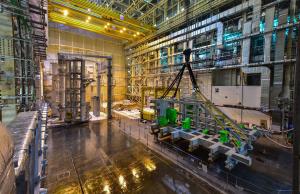Assembly Hall
Another massive handling tool
18 Nov 2019
Inside of the Assembly Hall, some of ITER's heaviest components will have to be raised ever so carefully from their horizontal delivery positions to vertical. This delicate operation is the job of the "upending tool"—a large, sturdy steel frame capable of handling 440-tonne vacuum vessel sectors and 360-tonne toroidal field coils with utmost precision.
The upending tool (right) was delivered to the Assembly Hall on 6 November and is now being assembled and precisely positioned on a set of base plates embedded in the floor in the far right corner.
Procured by Korea, the upending tool was delivered to ITER on 6 November. The 18-metre long, 14-metre wide frame came in two halves that are presently being assembled and positioned on dedicated base plates embedded into the building's floor.
Contrary to the twin pre-assembly tools (SSAT), the upending tool does not feature any mechanical, electrical or hydraulic machinery. It is basically a steel frame, but a highly sophisticated one. "The tool is huge," says Assembly Support Section Leader Hyung Yeol Yang. "Controlling the overall dimensions within tolerances of less than 2 millimetres was very challenging for ILJIN, the Korean manufacturer."
The tool is designed to handle two types of components that have nothing in common except their exceptional size and weight: 440 tonnes for a vacuum vessel sector, 360 tonnes for a toroidal field coil. Switching from one to the other will require a complete reconfiguration of the component's supports inside the frame.
The tilt operations, with the upending tool and its load suspended to the hooks of the overhead crane, will need to be repeated 27 times in order to deliver vacuum vessel sectors and toroidal field coils to the pre-assembly tools. The process will be a slow one: up to three weeks to finalize each operation.


